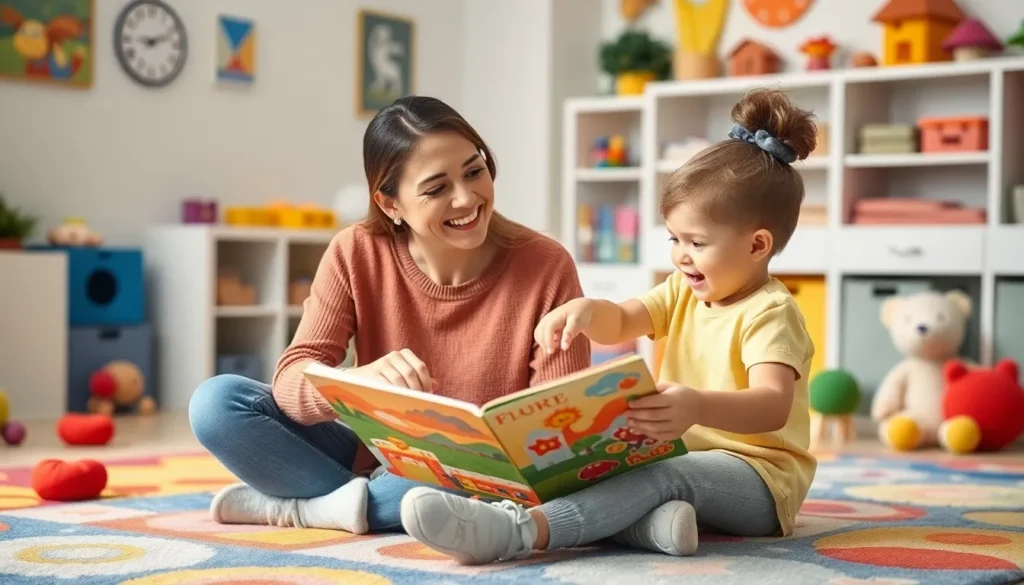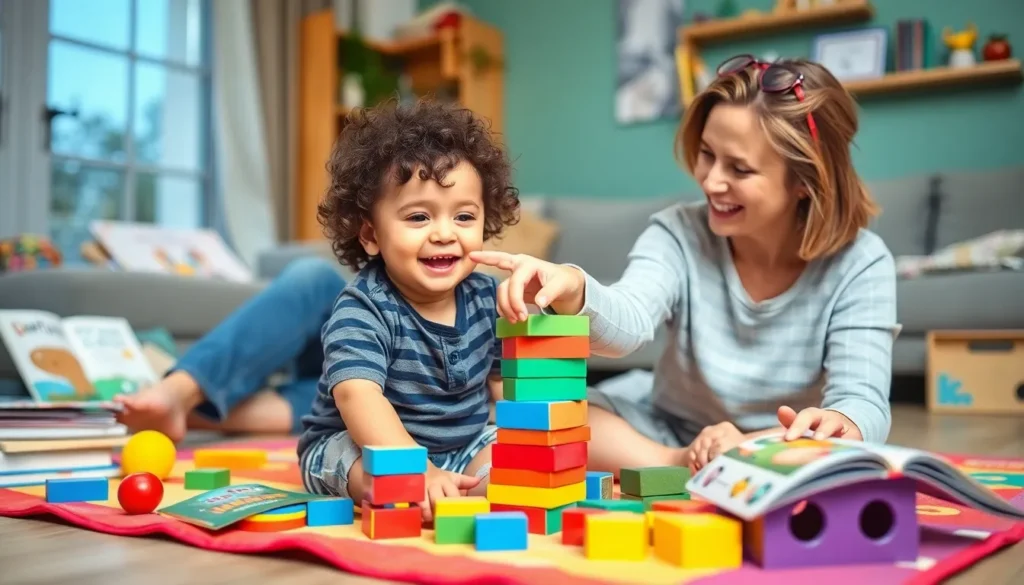Table of Contents
ToggleEvery parent wants to see their toddler thrive, and language development plays a crucial role in that journey. Engaging toddlers in fun and interactive language activities not only enhances their vocabulary but also boosts their confidence in communication. These early experiences lay the foundation for effective speaking and listening skills.
From simple storytelling to playful songs, there are countless ways to spark a toddler’s interest in language. Incorporating these activities into daily routines can transform learning into an enjoyable adventure. As they explore words and sounds, toddlers will develop essential cognitive skills while building their social connections.
Importance Of Language Activities For Toddlers
Engaging in language activities significantly enriches toddlers’ early development. Language activities boost vocabulary acquisition, enhance communication skills, and promote cognitive growth.
Vocabulary Development
Language activities introduce toddlers to new words in context. Repetitive exposure through songs, rhymes, and stories helps solidify word meanings. For example, reading daily can expand a child’s vocabulary by 20 to 30 words per week.
Communication Skills
Interactive language activities facilitate effective communication. Through conversations and storytelling, toddlers learn to express thoughts clearly. This practice builds confidence, encouraging them to participate in discussions.
Cognitive Skill Enhancement
Language development influences essential cognitive skills. Engaging in activities like matching sounds and words or playing word games stimulates critical thinking. Studies show that strong language skills correlate with better academic performance later in life.
Social Connections
Language activities foster social interactions. Group storytelling or singing invites collaboration among peers. These experiences help toddlers understand social cues and develop relationships with others.
Emotional Growth
Language activities support emotional expression. Teaching toddlers to label their feelings through books or songs promotes emotional intelligence. Recognizing and communicating emotions leads to healthier social interactions.
Incorporating language activities into daily routines creates a rich language environment. Maximizing opportunities for toddlers to engage with language shapes their overall development, ensuring they thrive both academically and socially.
Types Of Language Activities

Engaging toddlers in diverse language activities promotes healthy language development and enhances communication skills. Below are several effective types of activities.
Storytime Sessions
Storytime sessions create opportunities for toddlers to listen and interact with language. Parents can choose age-appropriate books featuring colorful images and simple text to hold their attention. Reading aloud encourages toddlers to comprehend the narrative, identify characters, and predict outcomes. Incorporating questions during reading improves critical thinking and vocabulary retention, while allowing toddlers to express their preferences for stories fosters engagement.
Interactive Games
Interactive games stimulate language learning in a fun and engaging way. Games, such as “I Spy” and simple board games that involve turn-taking and communication, develop vocabulary and listening skills. Language-based apps designed for toddlers also promote learning through visual and auditory interactions. Participation in group games encourages social interaction and helps toddlers practice language skills while building confidence in their communication abilities.
Music And Songs
Music and songs play a vital role in language development. Singing together reinforces vocabulary through melodies, rhythms, and repetition. Simple songs with actions, like “Itsy Bitsy Spider,” promote physical coordination and enhance memory through movement. Parents can create language-rich environments by incorporating nursery rhymes or custom songs that resonate with toddlers’ experiences. Engaging with music encourages creativity and fosters a positive association with language learning.
Benefits Of Language Activities For Toddlers
Language activities promote crucial developmental benefits for toddlers, enhancing their cognitive abilities and social skills. Engaging children in these activities lays a strong foundation for their overall growth.
Cognitive Development
Cognitive development, the process of acquiring knowledge and understanding, significantly benefits from language activities. Through exposure to new vocabulary and concepts, toddlers experience a 20 to 30-word vocabulary expansion each week. Engaging in storytelling and interactive games stimulates brain activity and strengthens memory, enabling toddlers to think critically. Activities like singing songs and reciting rhymes improve auditory skills and language processing, paving the way for increasing comprehension and problem-solving abilities. Language-rich environments foster creativity as toddlers learn to construct sentences and express thoughts, which contributes to their intellectual growth.
Social Skills Enhancement
Language activities play a vital role in enhancing social skills for toddlers. Engaging in group storytelling sessions fosters turn-taking and respectful listening, essential skills for effective communication. Interactive games encourage cooperation and teamwork, supporting healthy peer interactions. By labeling emotions and discussing characters’ feelings in stories, toddlers learn to understand and express their feelings, strengthening emotional intelligence. Exposure to diverse language patterns during activities boosts empathy, helping toddlers relate to others. Overall, these rich language experiences cultivate essential social skills that prepare toddlers for successful interactions throughout their lives.
Tips For Parents And Caregivers
Engaging toddlers in language activities enhances their development. Parents and caregivers can implement practical strategies to create a language-rich environment and encourage communication through play.
Creating A Language-Rich Environment
Creating a language-rich environment involves integrating language into daily activities. Parents can surround toddlers with books and read aloud regularly, introducing new vocabulary and concepts. Label objects around the house, making words tangible and familiar. Foster conversations during everyday tasks, asking open-ended questions to stimulate dialogue. Use descriptive language when discussing everyday experiences, providing context and expanding vocabulary. Ensure that interactions are responsive, encouraging toddlers to express themselves and develop their verbal skills.
Encouraging Communication Through Play
Encouraging communication through play enhances toddlers’ language skills while making learning enjoyable. Incorporate games that require verbal interaction, such as role-playing or storytelling. Use puppets or toys to create scenarios that inspire dialogue and imaginative thinking. Engage toddlers in activities like singing songs and reciting rhymes, reinforcing patterns and vocabulary through repetition. Explore educational apps that promote language skills, ensuring they remain interactive and playful. Celebrate verbal attempts, providing positive reinforcement and fostering confidence in communication.
Engaging toddlers in language activities is essential for their overall development. These activities not only enhance vocabulary and communication skills but also foster cognitive and social growth. By making learning enjoyable through storytelling songs and interactive games parents can create a rich language environment that encourages exploration and expression.
As toddlers participate in these activities they build confidence and critical thinking abilities that will serve them well in the future. The benefits extend beyond early childhood laying a strong foundation for academic success and healthy social interactions. Prioritizing language-rich experiences ensures toddlers are well-equipped for the challenges ahead.







